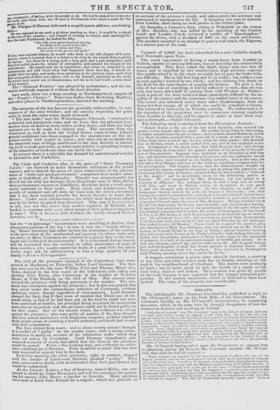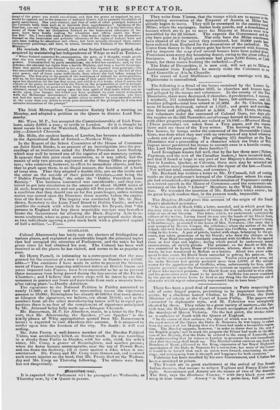IRELAND.
The indefatigable Mr. Sharman Crawford has published a reply to Mr. O'Connell's letter on the Irish Bills of the Government. He comments forcibly on Mr. O'Connell's inconsistency, in supporting measures, which at the same time be strongly disapproves of and de- nounces as delusive and insulting to Ireland.
"Catholics of Ireland," says Mr. Crawford," look to the lists of divisions, anti you will find your leader voting in support of the Tithe Bill. In that list, Sir, yota appear voting for a bill, to the iniquity of w hieli you beAr testimony, in the words I have quoted. You vote for this inkplitoos bill, framed by the Toi les, iu order to give a new secutity to the Church. without having eVeil sretired the other terms of this detestable coupromise. I may say, indeed,. ith 11 positive knowledge, that they would be virtually rejected. Your compromise was, substantiatk, to surrender N our claims for religious liberty, it, consideration of getting that political liberty a hint would be derivt41 wore the conceding of a popular Corporation Bill You describe the Municipal Bill as ' a natisnal owekery—a vicious lelu,iwt; ' and, yet, you place iti thu hands of the sup- porters of Chruch monopoly the full extent ot their demands, and he-au the political liberties of Ireland at their mercy."
Mr. O'Connell having called upon the Protestants to support him in obtaining justice for Ireland, Mr. Crawford reminds Mr. O'Con- nell, that once he had his support.— " When Ireland was insulted by the Grey Government, I rallied a ith you on the Repeal question, awl ou the profession of certain other great principles of religious and political freedom. I went to Voliament, to support these principles iu conjunc-. lion, as I expected, with you. and the Members represehting the Catholic interest. I found there, that principles were to be put in obey ance ; I found former profession* :toll declarations disregarded, and that the sopport of a political party wits to be the paramount object ; and finding, also, that your policy met the approval of your Catho-
lic country men. I retired from the scene. is this the encouragement which you offer for Protestant support? Why did the Protestants generally oppose you? From sr.
dresd of the power you would coutolittate. rind that the power so acquired by you, would be applied, not to the purposes of national liberty, but to promote the objects of party ascendancy. Ilas your conduct, and that of some of other principal leaders of the Catholic body, been such as to diminish their apprehensions ? Speaking of the Peor.lawoou say—' One thing alone has greatly shocked me: it is the disCovery that twiny or those who set themselves forward as the benevolent advocates of the poor, have been busily looking for situations and offices under the Poor-
law Sir, I have also made a discovery : that many of those who set themselves forward as the benevolent and patriotic advocates of the rights of Ireland have not only been looking for situations and offices, but have actually obtained them under Government patronage, and have, in return, become the Tailmen of the Melbourne Ministry
He reminds Mr. O'Connell, that what Ireland has really gained, she acquired by maintaining her independence of Whigs as well as Tories-
" When Iteland contested for emancipation, she gave, as I thought, ample proofs that she was worthy of liberty. She carried on this conical, trusting on her powers. Untrammelled by party associations, she defied her enemies; mad, by that defiance, she extorted her rights from a hostile Ministry, and from a hostile Sovereign. Since that period, she has faltered in her step—she has departed from prineiple—she has connected herself with a faction ; and now she lies prostrate at the feet of tint Very power, and of those same individuals, from whom she hail before wrung her liberties. The first step in the proofs of the worthiness of Ireland fur self.legislat ion, will be, by her tearing herself from the ineubss of that party which you have bound upon her shoulders, for the last four years, and which is ever ready, when it serves the objects of the party, to combine with the Tories in the perpetration of evil to Ireland, and from which arty no good ever has been obtained, or, I appreheud. ever will be obtained, except by Ireland acting upon the true spirit of that motto w hich you in- scribe upon your banner, but which you have profaned by your servile comwxion with the Melbourne Ciovernmeat ; and which, since that connexion, you 'HIVE not had the moral courage or the public virtue to enforce by your example. whilst at the same time you desire to cover your dereliction of the principle by a vain and delusive declaration of the precept."



























 Previous page
Previous page